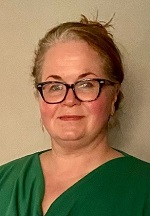Course Report
Palliative Care and Radiotherapy - PDF Version
28-30 November 2021, online
Course directors:
Peter Hoskin, clinical oncologist, Mount Vernon Hospital, London, & University of Manchester, Manchester UK
Yvette van der Linden, radiation oncologist/head of expert centre in palliative care, Leiden University Medical Center, Leiden, The Netherlands
A dosimetrist’s perspective:
My name is Debby Kavanagh. I am a dosimetrist working at the Dr. H. Bliss Murphy Cancer Centre, which is a part of Eastern Health, our regional health authority. I am based in the city of St. John’s, in the province of Newfoundland, Canada. I have been working in the field of dosimetry for 19 years.
Our clinic is currently in the process of establishing more treatment protocols specifically for palliative radiotherapy. As a member of our new palliative site group, I wanted to research current practices not only here in Canada, but also in Europe and the USA. I was intrigued by the fact that this course was not solely focussed on radiotherapy but also included other aspects related to the care of palliative patients, such as pharmacology, mechanisms of pain, quality of life and end-of-life issues. Of lesser importance ‑ but still a factor in my choice ‑ was that this course was offered online. Thus, it was extremely convenient and cost-effective; this was an important consideration considering the worldwide pandemic.
I thoroughly enjoyed this course. I found all the topics thought-provoking and informative. The faculty’s clinical expertise and wisdom were demonstrated through their presentations and case studies. I particularly enjoyed the latter. Rarely does any patient’s presentation follow a text, and it was extremely interesting to learn the detailed aspects of each patient’s disease progression and the subsequent discussions with the patient, clinical decisions made and therapies that were involved. The faculty encouraged interaction throughout the course, which, in my opinion, is a hallmark of a valuable learning experience.
The polls that they employed throughout were also excellent. Used in conjunction with case studies, they stimulated lively discussion among the whole group. This led to another great aspect of the course ‑ the online chat. This was a great tool that was very engaging and informative and made it possible to learn about various approaches that were taken to palliative care and treatment from people who were based literally around the globe. It was very rewarding to learn that the practices in our own clinic were in keeping with many of the recommendations from the experts.
Learning about the various dose fractionation schedules used by the faculty members in their own clinics was very useful. I was also interested to learn about the use of brachytherapy in certain situations. In my clinic, we use our high-dose-rate brachytherapy (BT) unit almost exclusively for radical prostate and gynaecological cases. The discussions that I heard regarding use of BT for gastric and oesophageal cancers have inspired me to bring the topic up with my radiation oncologist colleagues as something we could work towards to add to our palliative radiotherapy tool box.
As a dosimetrist, my treatment plans are only one step in a patient’s journey. It was invaluable for me to learn about other aspects of palliative therapy and treatment of the patient as a whole rather than with the focus on just their disease. I realised that it is most important to discuss with the patient and their family what they actually want. Everyone is an individual and their palliative treatments and therapies must be individualised. Communication between the clinician and the patient is paramount.
It’s also important to remember that just because we can offer complex treatments doesn’t mean such treatment may be the best option for our patients. As a treatment planner, I will bear this in mind in future. In some cases, keeping things simple is a thoughtful act of caring.
I found the course very educational, enlightening and thought-provoking. I would recommend it to any of my colleagues. The quality of the faculty was excellent. The course material encompassed many aspects pertaining to the care of palliative cancer patients. Another unexpected benefit from the course was that it gave food for thought to me personally. Quality of life is most important.

Debby Kavanagh
Dosimetrist
Dr. H. Bliss Murphy Cancer Centre
Eastern Health – Cancer Care Program
St. John’s, Newfoundland, Canada
debby.kavanagh@easternhealth.ca